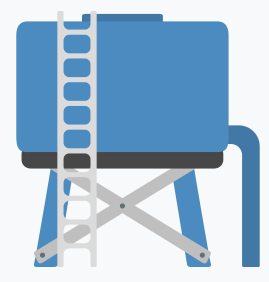Important Tips: Pipes and Cisterns | Quantitative Aptitude for SSC CGL PDF Download
Inlet and Outlet
The inlet pipe is designed to fill the cistern, whereas the outlet pipe is intended for emptying it. If a pipe can fill a tank in x hours, then the rate at which the pipe can fill the same tank in 1 hour is equal to 1/x.
Pipes and Cisterns Tips and Tricks & Shortcuts
Here, are quick and easy tips and tricks for you to solve Pipes and Cisterns questions quickly, easily, and efficiently.

Tips and tricks and shortcuts of Pipes and Cisterns questions
- Pipes and Cisterns questions on are almost like Time and Work questions.
- In pipes and cistern problems, the portion of the tank are filled or emptied is calculated and it is relatively same as the amount of work done in time and work problems.
- Similarly, time taken to fill or empty a tank completely or to a desired level is the time taken to do a piece of work.
- Consider Efficiency: If the efficiency of a pipe is given, adjust the rate accordingly. For example, if a pipe has 80% efficiency, its rate is 80% of the normal rate.
- Be very careful with unit conversions, as they play a very important in role. Your answers may get wrong because of not proper conversion of unit.
Type 1: Calculate time taken to fill a tank by two or more pipes
Example 1: Two pipes A and B are connected to a container. Pipe A can empty the container in 20 minutes and pipe B can empty the container in 30 minutes. Both A and B are opened together. Find out the time to empty the container completely?
(a) 12 mins
(b) 14 mins
(c) 10 mins
(d) 7 mins
Ans: (a)
Let the size of the container be = 60 units [LCM (20, 30)]
Efficiency of pipe A = 60/20 = 3 units
Efficiency of pipe B =60/30 = 2 units
Combined efficiency of pipe A and pipe B = 5 units/min
So, time required to empty the container with both pipes = 60/5 = 12 mins
Type 2 : Tips and Tricks and Shortcuts for Pipes and Cisterns Problems related to Calculate time taken to fill a tank having a hole or leakage
Example 2: A pipe takes 5 hours to fill a water tank but because of leakage, it takes 3 hours more. Find out the number of hours taken by leakage pipe to empty the full water tank?
(a) 40/3 hrs
(b) 3/40 hrs
(c) 3/47 hrs
(d) 2/51 hrs
Ans: (a)
Water tank filled in 5 hours = 1/5
Now, due to outlet pipe, 1 hour part filled = 1/8
Part of the water tank emptied in 1 hour 
So, the leak will empty the full water tank in 40/3 hrs
Type 3: Calculate Time Taken When Pipes Are Opened For Different Periods
Example 3: There are three pipes A, B and C, which can fill the tank in 10 hours. All the three pipes were opened for together for 5 hours, C is closed and inlets A and B fill the remaining part in 12 hours. Find the time taken by C alone to fill the tank.
(a) 18 hrs 7 mins
(b) 17 hrs 8 mins
(c) 18 hrs
(d) 17 hrs
Ans: (b)
Part of the tank filled by the pipes A, B and C in 1 hour = 1/10
Part of the tank filled by the pipes A, B and C in 5 hours 
Remaining portion of tank to be filled = 
Now, when A and B are open
Part of the tank filled by A and B in 1 hour
Therefore, part of the tank filled by C in 1 hour 
Time taken by C alone  hours which can be written as 17 hrs 8 mins
hours which can be written as 17 hrs 8 mins
|
317 videos|294 docs|185 tests
|
FAQs on Important Tips: Pipes and Cisterns - Quantitative Aptitude for SSC CGL
| 1. What is the concept of inlet and outlet pipes in pipes and cisterns? |  |
| 2. How do you calculate the time taken to fill a cistern when both the inlet and outlet pipes are open? |  |
| 3. Can the rate of filling and emptying of a cistern be given in terms of the capacity of the cistern? |  |
| 4. How do you calculate the time taken to fill a cistern when the inlet and outlet pipes are connected in series? |  |
| 5. Can the rates of filling and emptying be given in terms of fractions? |  |
















